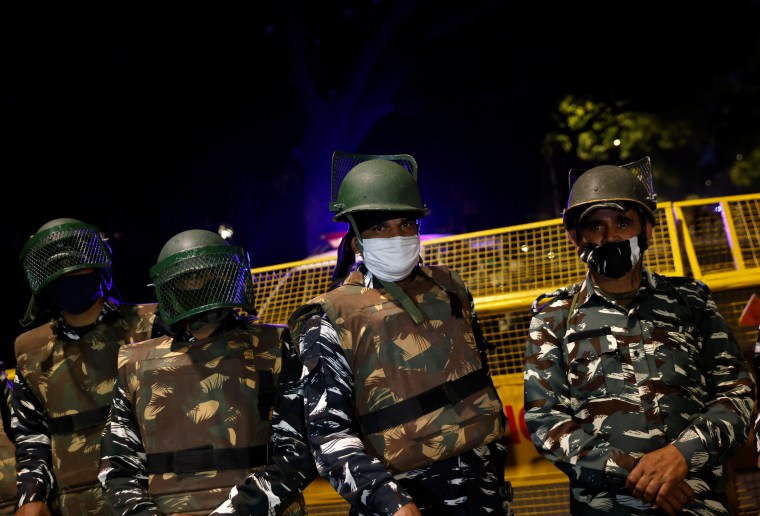New Delhi, February 1, 2021 – Indian authorities must immediately release journalist Mandeep Punia and refrain from detaining and investigating members of the press covering protests, the Committee to Protect Journalists said today.
On the evening of January 30, Delhi police detained Mandeep Punia, a contributor to The Caravan magazine and Junputh news website, and Dharmendra Singh, a reporter with the YouTube news channel “Online News India,” while they covered protests held by farmers over new laws that critics allege will lead to increasing privatization in farming, according to news reports and Junputh editor Abhisekh Srivastava, who spoke to the CPJ over the phone.
Authorities released Singh without charge yesterday, but Punia remains in custody, according to news reports and Srivastava.
Since January 28, police have also opened at least eight investigations into journalists and media outlets that have covered the protests, according to news reports.
“We are extremely alarmed by the authorities’ treatment of journalists and news organizations reporting on the farmers’ protests in India, which is an issue of national importance,” said Aliya Iftikhar, CPJ’s senior Asia researcher. “Indian authorities must immediately release journalist Mandeep Punia and drop all investigations into journalists and news outlets who have been diligently covering the protests.”
Early in the morning of January 31, authorities opened an investigation into Punia for allegedly violating four sections of the Indian penal code pertaining to obstructing and assaulting police personnel, according to a copy of the police complaint, which CPJ reviewed. A court ordered him to be held in judicial custody for 14 days pending investigation, according to reports.
If charged and convicted of assaulting and obstructing police, he could face up to three years imprisonment under Indian law.
In an interview with his employer released today, Singh said that he was documenting a scuffle between police and local laborers when officers confiscated his camera and detained him. Singh said that Punia was standing nearby and intervened to stop police harassing Singh, prompting officers to take him into custody as well.
Newslaundry aired a video in which Punia and Singh can be seen being dragged away by baton-wielding police officers.
Separately, since January 28, police in the states of Uttar Pradesh, Haryana, Madhya Pradesh, Karnataka, and Delhi have opened investigations into at least eight journalists over their coverage of allegations that Delhi police killed a protesting farmer January 26, which police deny, according to news reports.
Six of those journalists were named in identical complaints accusing them of several violations of the Indian Penal Code, including sedition and promoting enmity between groups, according to those reports. Those journalists include Rajdeep Sardesai of the India Today news channel, Mrinal Pande of English-language daily National Herald, Zafar Agha of Urdu-language newspaper Qaumi Qwaz, and Paresh Nath, Anant Nath, and Vinod K. Jose of The Caravan, according to multiple news reports.
The complaints cite tweets by Sardesai, Pande, Agha, and The Caravan about the killing, according to those reports.
If charged and convicted of sedition, the six could face up to life imprisonment under Indian law.
In response to a different complaint relating to the killing, on January 30 Uttar Pradesh police opened an investigation into New Delhi-based independent news website The Wire, its editor Siddharth Varadarajan, and reporter Ismat Ara, according to multiple news reports and a copy of the complaint, which CPJ reviewed.
The complaint cites two tweets and a news article, which reported that the family of the slain protester refused to accept the Delhi police’s claim that he was not shot to death.
The complaint, filed by a resident of Uttar Pradesh state, alleges that the tweets and article “led to anger among the common people in Rampur [in Uttar Pradesh state] and has given rise to tension,” and accused Varadarajan of creating or promoting enmity between classes, among other crimes. Varadarajan told CPJ today that Ara has also been added to the complaint.
If charged and convicted of promoting such enmity, the journalists could face up to three years imprisonment under Indian law.
Vardarajan told CPJ via messaging app that he believed the investigations into journalists who covered the protester’s death risk criminalizing the act of questioning a postmortem or airing accusations against the police.
Pande told CPJ that she is consulting her lawyer. CPJ texted Agha, Sardesai, Naths, and Jose for comment but did not receive any responses.
CPJ emailed police spokespeople in Uttar Pradesh, Haryana, Madhya Pradesh, Karnataka, and Delhi, but did not receive any responses.
Separately, today police arrested Kapil Viayan, a law student, for allegedly sending death and rape threats via Twitter to Rohini Singh, a freelance journalist and a contributor to The Wire, according to The Wire and the Hindustan Times.
The Indian government has also been regularly suspending internet access in parts of Haryana and three protest sites in Delhi since January 26, according to local and international news reports. According to the Times of India, the Home Ministry has extended the suspension affecting parts of Delhi until tomorrow.
CPJ is also investigating reports that Twitter accounts covering the protests were briefly suspended today.
According to news reports, the Information and Technology Ministry directed the social network to block 100 accounts and 150 tweets for “using a controversial hashtag” and making “fake, intimidatory and provocative tweets” at the request of the Home Ministry, “to prevent any escalation of law and order in view of the on-going farmer agitation.”
Twitter later issued a statement saying that it is required to abide by local laws and that, “if we receive a properly scoped request from an authorised entity, it may be necessary to withhold access to certain content,” according to those reports.
The accounts of The Caravan and Shashi Shekhar Vempanti, the CEO of state broadcaster Prasar Bharati, were included in the brief suspension, and are now back online, according to The Quint and NDTV.
CPJ emailed Twitter and India’s Home Ministry for comment, but did not immediately receive any responses.
